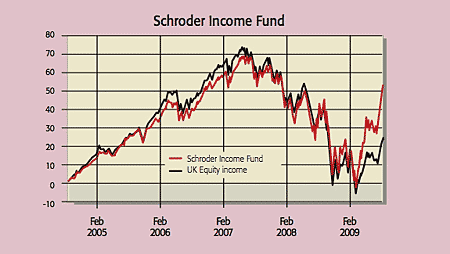Get the latest financial news, insights and expert analysis from our award-winning MoneyWeek team, to help you understand what really matters when it comes to your finances.
You are now subscribed
Your newsletter sign-up was successful
Want to add more newsletters?

Twice daily
MoneyWeek
Get the latest financial news, insights and expert analysis from our award-winning MoneyWeek team, to help you understand what really matters when it comes to your finances.

Four times a week
Look After My Bills
Sign up to our free money-saving newsletter, filled with the latest news and expert advice to help you find the best tips and deals for managing your bills. Start saving today!
Absolute return funds were the fourth most popular category of investment in June, according to the Investment Management Association. But should they be?
Out of 14 such funds tracked by Trustnet.com, only six have made a positive return over the past 12 months. The performance of those that have been around more than a year is even worse: they're down 0.52%. Sure, that compares well to the 15.72% loss for the FTSE 100 over that period, but not to the positive return you could have achieved from a savings account. And it calls into question the claim made by many to be able to make money in falling, as well as rising, markets.
Unlike more traditional 'long only' funds, absolute return funds are not dependent on rising share prices to make money. They can also short stocks a technique that allows them to bet that prices will fall. Most can also pick from a wide range of asset classes, including equities, bonds and money market instruments. So absolute return funds tend to be less risky than a pure hedge fund, and should offer less volatility than an equity fund. That makes them popular investments when the market is diving. So it's no big surprise that they were the third bestselling type of unit trust in 2008.
MoneyWeek
Subscribe to MoneyWeek today and get your first six magazine issues absolutely FREE

Sign up to Money Morning
Don't miss the latest investment and personal finances news, market analysis, plus money-saving tips with our free twice-daily newsletter
Don't miss the latest investment and personal finances news, market analysis, plus money-saving tips with our free twice-daily newsletter
But we're not convinced. If you want to preserve your capital, why not put your money in a savings account? And if you're looking for higher, relatively safe returns, we would go for blue-chip shares. Not only are these cheap having not been swept up in the current rally but buying them means you can avoid the galling fees charged by some absolute return funds.

Take the Blackrock UK Absolute Alpha fund. It is up 3% over one year, making it one of the most successful on the market. But it has a heady total expense ratio of 2.62%, due to charging investors 20% of any returns over Libor (the interest rate banks charge each other for loans). Nick Purves' Schroder Income fund, on the other hand, which looks for shares that are priced cheaply compared to the company's underlying assets, is up 6.1%. Top holdings include oil giants Shell and BP, more traditional pharmaceutical bellwether stocks and South African insurer Old Mutual. It boasts a more modest total expense ratio of 1.65%.
And that matters. If you invest £10,000 and assume a return of 7% a year, after 25 years you would have £35,919 in the Schroders fund, or just over £28,000 in Blackrock. Ouch.
Get the latest financial news, insights and expert analysis from our award-winning MoneyWeek team, to help you understand what really matters when it comes to your finances.
MoneyWeek is written by a team of experienced and award-winning journalists, plus expert columnists. As well as daily digital news and features, MoneyWeek also publishes a weekly magazine, covering investing and personal finance. From share tips, pensions, gold to practical investment tips - we provide a round-up to help you make money and keep it.
-
 Should you buy an active ETF?
Should you buy an active ETF?ETFs are often mischaracterised as passive products, but they can be a convenient way to add active management to your portfolio
-
 Power up your pension before 5 April – easy ways to save before the tax year end
Power up your pension before 5 April – easy ways to save before the tax year endWith the end of the tax year looming, pension savers currently have a window to review and maximise what’s going into their retirement funds – we look at how

